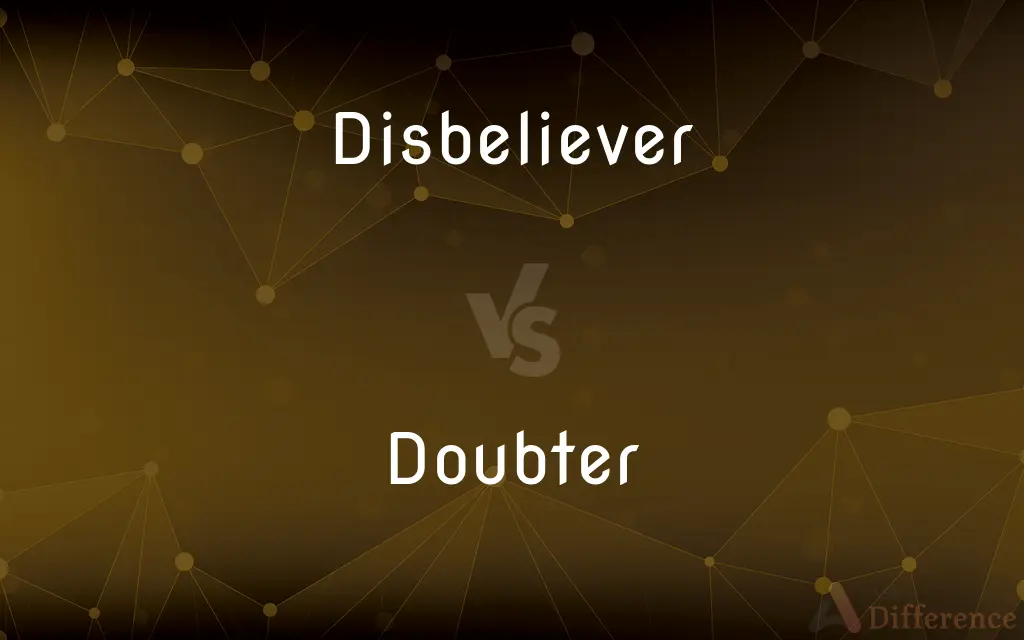Disbeliever vs. Doubter — What's the Difference?
Edited by Tayyaba Rehman — By Fiza Rafique — Updated on May 18, 2024
A disbeliever rejects a belief or claims outright, while a doubter questions or feels uncertain about a belief or claim without necessarily rejecting it.

Difference Between Disbeliever and Doubter
Table of Contents
ADVERTISEMENT
Key Differences
A disbeliever is someone who outright rejects a particular belief or claim. This person has made a firm decision against accepting a specific idea, often based on evidence or personal conviction. A doubter, on the other hand, is someone who is uncertain about a belief or claim. Doubters question the validity of an idea but haven't necessarily rejected it. Their stance is one of skepticism and inquiry rather than outright denial.
Disbelievers often have a more definitive stance compared to doubters, who are open to being convinced with further evidence or reasoning. Disbelievers tend to be resolute in their rejection, while doubters remain in a state of uncertainty.
While both terms involve a lack of belief, the disbeliever's stance is final and often immovable, whereas the doubter's stance is tentative and open to change. This fundamental difference shapes how they approach discussions and evidence regarding the belief or claim in question.
In social interactions, disbelievers may come across as more confrontational, given their firm rejection, whereas doubters may engage more in discussions, seeking clarity and evidence to resolve their uncertainty.
Comparison Chart
Definition
Rejects a belief or claim outright
Questions or feels uncertain about a belief or claim
ADVERTISEMENT
Stance
Firm and definitive
Skeptical and tentative
Openness to Change
Less likely to change their stance
Open to being convinced with evidence
Approach
Often confrontational
Inquisitive and questioning
Example
A disbeliever in climate change denies its existence
A doubter of climate change is unsure about its implications
Compare with Definitions
Disbeliever
Rejects belief or claim outright.
As a disbeliever in ghosts, she dismissed the haunted house stories.
Doubter
Questions or is uncertain about a claim.
As a doubter of the new policy, she wanted more details before forming an opinion.
Disbeliever
Firm stance against an idea.
The disbeliever refused to accept any evidence supporting the theory.
Doubter
Skeptical yet open to evidence.
The doubter listened to both sides of the argument before deciding.
Disbeliever
Denies existence or validity.
He is a disbeliever in astrology and thinks horoscopes are nonsense.
Doubter
Inquisitive and questioning.
The doubter asked numerous questions to understand the research fully.
Disbeliever
Strong personal conviction.
The disbeliever of climate change often debates scientists and activists.
Doubter
Tentative stance on belief.
He is a doubter of the miracle cure, seeking more scientific validation.
Disbeliever
To refuse to believe or accept; reject
There is no reason to disbelieve his story.
Doubter
Open to being convinced.
Initially a doubter, she became a supporter after seeing the compelling evidence.
Disbeliever
To withhold or reject belief.
Doubter
To be undecided or skeptical about
Began to doubt some accepted doctrines.
Disbeliever
One who disbelieves; one who does not believe.
Doubter
To tend to disbelieve; distrust
Doubts politicians when they make sweeping statements.
Disbeliever
One who disbelieves, or refuses belief; an unbeliever. Specifically, one who does not believe the Christian religion.
Doubter
To regard as unlikely
I doubt that we'll arrive on time.
Disbeliever
Someone who refuses to believe (as in a divinity)
Doubter
(Archaic) To suspect; fear.
Disbeliever
Unmoved by contrary evidence.
Despite the data, the disbeliever in evolution held onto their views.
Doubter
To be undecided or skeptical.
Doubter
The state of being uncertain about the truth or reliability of something.
Doubter
Often doubts A feeling of uncertainty or distrust
Had doubts about his ability.
Doubter
A point about which one is uncertain or skeptical
Reassured me by answering my doubts.
Doubter
The condition of being unsettled or unresolved
An outcome still in doubt.
Doubter
One who doubts.
Doubter
One who doubts; one whose opinion is unsettled; one who scruples.
Doubter
Someone who habitually doubts accepted beliefs
Doubter
A person who doubts truth of religion
Common Curiosities
What is a doubter?
A doubter questions or feels uncertain about a belief or claim without outright rejecting it.
Can a doubter become a believer?
Yes, doubters can become believers if presented with convincing evidence or reasoning.
Can a disbeliever become a believer?
While possible, disbelievers are generally more resolute and less likely to change their stance compared to doubters.
What is a disbeliever?
A disbeliever rejects a belief or claim outright, holding a firm stance against it.
How does a disbeliever approach evidence?
Disbelievers often dismiss evidence that contradicts their stance, focusing on their firm rejection.
How do doubters influence discussions?
Doubters may foster more balanced discussions by raising questions and seeking evidence.
Are disbelievers always confrontational?
Not always, but their firm rejection of a belief can lead to confrontational interactions.
What drives a disbeliever’s stance?
Disbelievers are often driven by strong personal convictions or a firm rejection of evidence.
What drives a doubter’s stance?
Doubters are driven by skepticism and a desire for further evidence or clarity.
How does a doubter approach evidence?
Doubters critically evaluate evidence and are open to changing their views based on new information.
Are doubters more open to discussion?
Yes, doubters are typically more open to discussion as they seek to resolve their uncertainties.
Do disbelievers and doubters share any similarities?
Both terms involve a lack of belief, but differ in the firmness of their stance and openness to change.
Can someone be both a disbeliever and a doubter?
Not simultaneously about the same belief; they represent different levels of rejection and uncertainty.
How do disbelievers influence discussions?
Disbelievers may challenge and confront, potentially polarizing discussions.
Can the terms 'disbeliever' and 'doubter' be used interchangeably?
No, they reflect different attitudes towards belief and evidence, with disbelievers rejecting and doubters questioning.
Share Your Discovery

Previous Comparison
Discover vs. Recover
Next Comparison
Grate vs. MashAuthor Spotlight
Written by
Fiza RafiqueFiza Rafique is a skilled content writer at AskDifference.com, where she meticulously refines and enhances written pieces. Drawing from her vast editorial expertise, Fiza ensures clarity, accuracy, and precision in every article. Passionate about language, she continually seeks to elevate the quality of content for readers worldwide.
Edited by
Tayyaba RehmanTayyaba Rehman is a distinguished writer, currently serving as a primary contributor to askdifference.com. As a researcher in semantics and etymology, Tayyaba's passion for the complexity of languages and their distinctions has found a perfect home on the platform. Tayyaba delves into the intricacies of language, distinguishing between commonly confused words and phrases, thereby providing clarity for readers worldwide.
















































